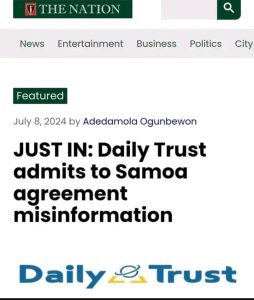By Muhammed Akindele

A recent post by Daily Trust regarding the SAMOA Agreement has caused some uproar across Nigeria. The report claimed the agreement, signed by the Federal government of Nigeria, contained clauses promoting LGBTQ+ rights. This sparked controversy, particularly among those whose religion doesn’t align with it.
However, the problem lies not with the agreement itself, but with a troubling Problem with Nigerian biases, i.e. the willingness to believe what aligns with existing beliefs, regardless of evidence. Even after the government vehemently denied the claims and threatened legal action, many clung to the original narrative. Should we call this confirmation bias?
Take Deji Adeyanju, a Social media activist and a Nigerian lawyer, as an example. Initially, he shared the article posted by Daily Trust on his social media page on Facebook. Thankfully, upon realizing the information was false, he took responsibility and issued a public apology on Facebook, even though a Social Media personality like Deji with a large number of followers would’ve done better by fact-checking the information thoroughly before sharing it on his handle.
I think it’s high time we remind these newsrooms that the speed of publishing doesn’t matter, accuracy does. The onus lies heavily on our media outlets to do better. They must establish a rigorous fact-checking process before publishing any information, particularly on sensitive topics like this. A strong commitment to journalistic integrity is very important to avoid fueling social and political tensions in the country.
We can learn from countries like Brazil, where the spread of fake news during their 2018 election nearly destabilized the entire democratic process. Nigeria cannot afford to repeat such mistakes.
Tackling misinformation requires many elements. Nigerian Media outlets need to prioritize verification, while the masses must also develop a critical eye for the information they consume. Social media platforms also have a role to play by implementing strict measures against the spread of false content. Finally, a need for sensitization is serially needed in order to reform the rate at which false information is being consumed.
